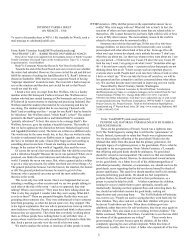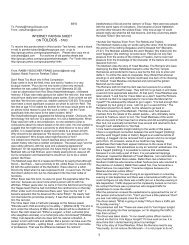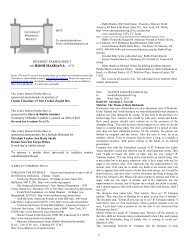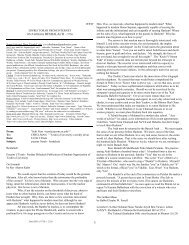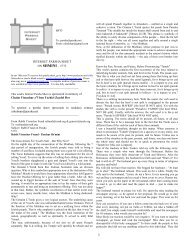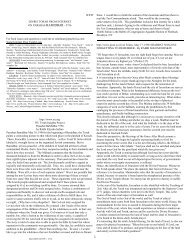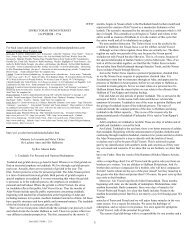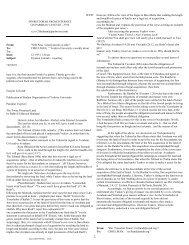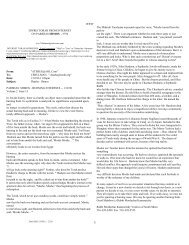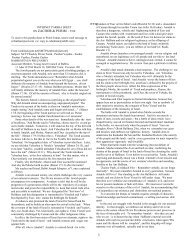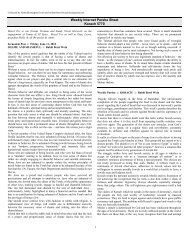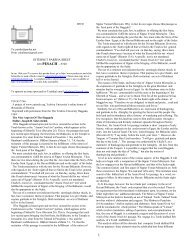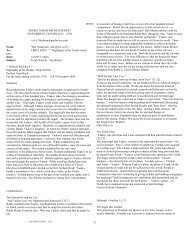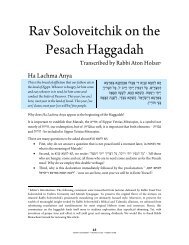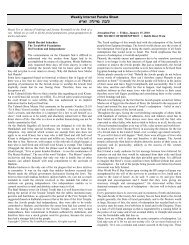ON PARSHAS TAZRIA-METZORA - 5756 - Internet Parsha Sheet
ON PARSHAS TAZRIA-METZORA - 5756 - Internet Parsha Sheet
ON PARSHAS TAZRIA-METZORA - 5756 - Internet Parsha Sheet
Create successful ePaper yourself
Turn your PDF publications into a flip-book with our unique Google optimized e-Paper software.
presses Shimon for a reason, may Shimon say specific remarks<br />
about the speaker, e.g., "he is boring", "he doesn't say any new<br />
ideas", etc.?<br />
DISCUSSI<strong>ON</strong>: Chofetz Chaim(1) says that it is prohibited to<br />
ridicule a Torah lecture even it is true that the delivery was<br />
poor or that the content was lacking depth. By ridiculing the<br />
lecture, serious harm can result to the reputation and<br />
effectiveness of the speaker. Sometimes a monetary loss can<br />
result. Therefore, rules the Chofetz Chaim, this action is<br />
prohibited and is considered Lashon Harah.<br />
The Chofetz Chaim does not, however, discuss a situation such<br />
as the one spelled out above. Reuven honestly needs to know if<br />
it is worth his time to attend the lecture. The information he<br />
is seeking from Shimon is pertinent to a decision he must make.<br />
Generally, the Halacha is that one may, and should, speak the<br />
truth about another when beneficial information is requested.<br />
Since Reuven deems this information to be beneficial to him, it<br />
seems that it is permitted for Shimon to tell Reuven that, in<br />
his opinion, there is no good reason for Reuven to attend the<br />
lecture. Although Shimon would not be allowed to ridicule or<br />
belittle the speaker himself, he would be permitted to advise<br />
Reuven that it may not be beneficial for him to attend. We must,<br />
however, stress several points:<br />
Although Shimon may be permitted to divulge this information,<br />
Reuven should not accept the information as the absolute truth.<br />
Reuven may only be suspicious enough to guard himself.<br />
Shimon should remember that what may seem boring to him, may<br />
very well be interesting and enlightening to Reuven, etc.<br />
Shimon's should voice his opinion only if he has no ulterior<br />
motive, e.g., a grudge against the speaker; he is jealous of the<br />
speaker, etc.<br />
QUESTI<strong>ON</strong>: Reuven is being angrily accused by Shimon of causing<br />
him harm. May Shimon exonerate himself by pointing at the guilty<br />
party?<br />
DISCUSSI<strong>ON</strong>: It is clearly forbidden for Reuven to divulge to<br />
Shimon the identity of the person who did him harm. Even if<br />
Shimon clearly asked "If not you, then who did it?" still Reuven<br />
may only declare his own innocence. He may only say: I did not<br />
do it.<br />
In a situation where there is only one other person who is a<br />
suspect and Reuven's declaration of innocence will directly<br />
implicate the other person, it is still permitted for Reuven to<br />
say that he is not the guilty party. But this is clearly<br />
permitted only in a situation where the alleged harmful action<br />
was actually improper. If the harmful action was not improper,<br />
e.g. it was done by accident, then it is questionable if Reuven<br />
may shift the blame by declaring his innocence(2).<br />
A child should not be asked by his Rebbe or parents to point a<br />
finger at a wrongdoer. This lessens the severity of the<br />
prohibition of Lashon Harah in the eyes of the child(3). A child<br />
who is instructed by a Rebbe or a parent to say Lashon Harah, is<br />
not required to listen to them(4). If, however the information<br />
is needed for a beneficial and constructive purpose, it is<br />
permitted for the child to divulge that information(5).<br />
QUESTI<strong>ON</strong>: Reuven, who in the past said Lashon Harah on Shimon,<br />
now seeks his forgiveness. If Shimon is unaware what exactly was<br />
said about him, is Reuven required to repeat to Shimon what he<br />
said about him in order for complete forgiveness to take place?<br />
DISCUSSI<strong>ON</strong>: If the Lashon Harah that was said was not accepted<br />
by the listeners and no harm was done to Shimon, Reuven does not<br />
need to ask for Shimon's forgiveness at all. He needs, however,<br />
to repent his sin directly to Hashem.<br />
If the Lashon Harah did cause harm to Shimon, Reuven must seek<br />
forgiveness directly from Shimon. If Shimon is unaware what was<br />
Doc#:DS3:217355.1 2331<br />
4<br />
said about him, Reuven must tell him(6). If the information will<br />
cause Shimon great embarrassment, then Reuven need not elaborate<br />
upon the Lashon Harah that was said(7).<br />
HALACHA is published L'zchus Hayeled Doniel Meir ben Hinda.<br />
If you wish to sponsor a HALACHA Discussion, receive it free via the<br />
<strong>Internet</strong> or have any questions, please call (216)321-6381/ FAX<br />
(216)932-5762 or E-mail 75310.3454@compuserve.com<br />
Distributed by: The Harbotzas Torah Division of Congregation Shomre<br />
Shabbos 1801 South Taylor Road Cleveland Heights, Ohio 44118<br />
* HaRav Yisroel Grumer, Marah D'Asra<br />
FOOTNOTES:<br />
1 Chofetz Chaim, Lashon Harah, 2:12.<br />
2 Chofetz Chaim, Lashon Harah 10:17 & Be'er Mayim Chaim 43.<br />
3 Igros Moshe YD 2:103.<br />
4 Chofetz Chaim, Lashon Harah 1:5.<br />
5 Like any Lashon Harah which is permitted when it said for a<br />
permitted purpose.<br />
6 Rabbeinu Yona in Shaarei Teshuva 207, quoted by Chofetz Chaim,<br />
Lashon Harah, 4:12<br />
7 Mishnah Berurah 606:3<br />
"Project Genesis ", " lifeline@torah.org"<br />
Project Genesis LifeLine - Volume III, Number 27 - Tazria / Metzorah<br />
Please pray for the speedy healing of Esther Miriam bat Aliza Geula and<br />
Chaim Efraim Betzalel ben Malka<br />
---------------------------------------------------------------------------<br />
"If one is poor, and he cannot afford [the regular sacrifice]..." [14:21]<br />
While the first parsha this week, Tazria, concerns the acquisition of<br />
impurity, the second reading of Metzorah begins by describing the<br />
purification process of the Metzorah, one afflicted with Tzora'as (often<br />
[inadequately] translated as "leprosy"). The parsha first describes the<br />
regular sacrifice, but then offers a second, less expensive sacrifice for a<br />
person who cannot afford the standard obligation.<br />
Rabbi Yisroel Mayer Kagan, the Chofetz Chaim, applies this concept to<br />
our<br />
day: to "serve G-d" means something different for each person, dependent on<br />
his or her current "wealth." He reprimands those who use the world around<br />
them as an excuse to relax. There are some people, he says, who learn Torah<br />
and pray to some extent, and tell themselves that if they are really not<br />
performing their obligations properly, their friends and neighbors do not<br />
even reach their own level of mediocre performance.<br />
He explains that these excuse-makers fail to see that those friends and<br />
neighbors are "poor in understanding," meaning that they do not understand<br />
their obligations at the same level. If one is poor, he can make do with a<br />
less expensive sacrifice, but a wealthy individual who brings the offering<br />
of the poor does not fulfill his obligation. So too in the performance of<br />
Mitzvos - a scholar is expected to demonstrate extra precision.<br />
There is a flip side to this as well, which also deserves our consideration.<br />
Every week, we at Project Genesis receive letters from around the world from<br />
Jews who have never studied their own Judaism seriously, and don't know<br />
where to begin. They look at our various offerings, and wonder how they can<br />
ever understand it all.<br />
First of all, we should be providing more introductory material on our Web<br />
site, to help people get started. This is a section that we do hope to<br />
create and develop over the coming months, with the generous support of<br />
readers and other contributors. Please be patient as we develop this resource.<br />
A new reader should also realize that he or she is not _expected_ to<br />
understand everything, and that this represents no failure. A person can<br />
only absorb so much, and one without an extensive background can fulfill his



